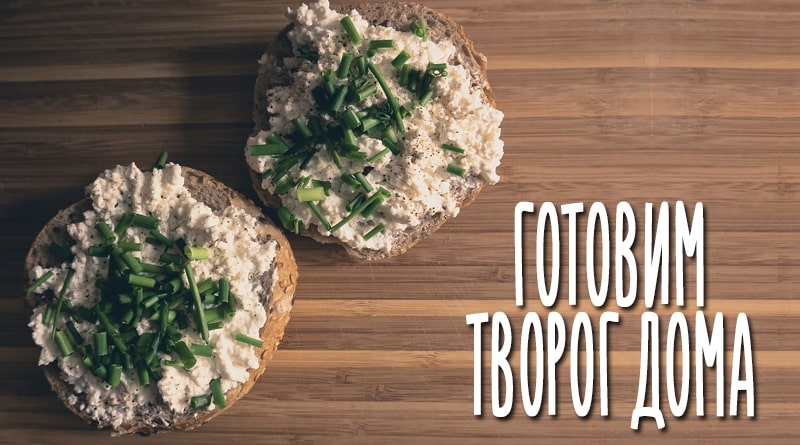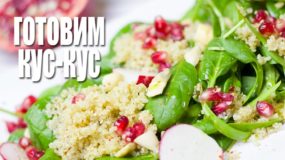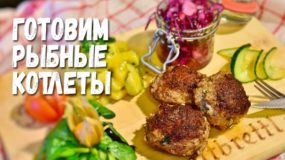High-quality farm milk is the main ingredient in homemade cottage cheese. Milk must be fermented naturally or add fermentation to it, then lightly heat on the stove, and it will break down into white curd lumps and whey.
Experienced housewives say that the best cottage cheese is that made from homemade milk, well, the maximum from selected raw materials. It can be bought in a plastic bottle, marked "solid". This milk has fat content, it is subjected only to pasteurization, so it is suitable for cooking delicious cottage cheese at home.
The output quality depends on how fermented and at what temperature they cooked. As a result, someone will cook soft cottage cheese, and someone will dry.
Preparation for cooking

You can figure out the cooking technology yourself. After you read the article and carefully study the recipes of home-made cottage cheese (our article is devoted to it) - snow-white or slightly creamy. It will not have vegetable fat, flour, starch, soy, as in many samples presented on the shelves of supermarkets.
Technology
Put a jar of milk in a warm place and wait for it to turn sour on its own. If you want to cook faster, add sourdough to the milk. It can be sour cream, kefir or calcium chloride (sold at the pharmacy). The resulting yogurt is heated slowly over a fire until the liquid turns into separate curd lumps and whey.
What is needed
Proper cottage cheese is only natural milk with a short shelf life and sourdough, without additives. It will be ideal if you can buy a farm product from a personal farmstead. Check if the milk is souring well, then it will make an excellent yogurt, so the product is suitable for cottage cheese. From fermented farm milk, you will get divine cottage cheese and natural sour cream from cream formed on the surface of curdled milk.
How much to take products and how to cook
Three liters of natural (non-powder) milk is enough to get 500 grams of cottage cheese. It must be fermented. Keep warm or add yeast. It can be 80 grams of sour cream, 1.5 liters of kefir or 6 tbsp. tablespoons of calcium chloride. Then warm the yogurt over low heat until clots and serum are obtained. Put the curd mass in cheesecloth, squeeze lightly and hang the bag so that the whey can drain.
Calorie homemade cottage cheese

According to doctors and nutritionists, only 10 tablespoons of quality cottage cheese will cover the daily need for protein and calcium.
| Cottage cheese | Proteins, g | Fats, g | Carbohydrates, g | Calories, kcal |
|---|---|---|---|---|
| "Homemade" from cow's milk | 16,9 | 18,1 | 3,1 | 233 |
| From kefir | 2,9 | 1,9 | 4,5 | 49 |
| From goat milk | 17,0 | 8,9 | 1,4 | 161 |
| Skim milk | 20,0 | 0,7 | 2,7 | 107,7 |
Classic cow milk recipe

To prepare quality cottage cheese with a divine taste, buy farm milk or from a personal farmstead.
- farm milk (also suitable for store milk) 3 l
- black bread (for sourdough) crust
- gauze
- Dip brown bread in fresh milk. Keep warm for about 3 days. Milk will turn sour and turn into yogurt.
- Put the yogurt in a saucepan and send to the stove, setting a low fire. If a layer of sour cream has formed on top, remove them and you will have natural sour cream at your disposal.
- Heat the yogurt for about 20 minutes, gently mixing a couple of times with a wooden spatula or spoon.
- Leave the pan with cottage cheese to cool. You can do it all night, during which time the mass will perfectly stratify. After placing the clot in cheesecloth, tie the ends and hang for a while to glass the serum.
Kefir cottage cheese
When cottage cheese is made from kefir, it is also left in a warm place until whey appears.
- 3 liters of kefir.
- Kefir should be kept warm to form a clear serum. When it begins to separate, place the container in a water bath (a large pan half full of water).
- Cook over low heat, about 10-15 minutes. Kefir should not boil!
- Turn off the fire, leave to cool.
- Cover the colander with gauze, put on a high pan. Gently put the curd into it. When excess whey drains, the product can be eaten. It can be put in a container and stored in the refrigerator, but not more than three days.
ON A NOTE! A small amount of whey should be preserved in the curd - from this it only tastes better.
How to cook goat curd
Tender goat milk curd is good for everyone, but I especially want to recommend it to people with allergies.
- 3 liters of fresh goat milk;
- 15 g of table salt.
- Bring milk to a boil, add salt and turn off after a minute. Leave in a warm room for a day for ripening.
- Heat the prepared yogurt over low heat, but do not bring it to a boil, otherwise the cottage cheese will turn out rubber.
- Cool the curd, then put in a gauze bag, squeeze slightly and place in a colander so that the glass serum.
Cooking diet fat-free cottage cheese
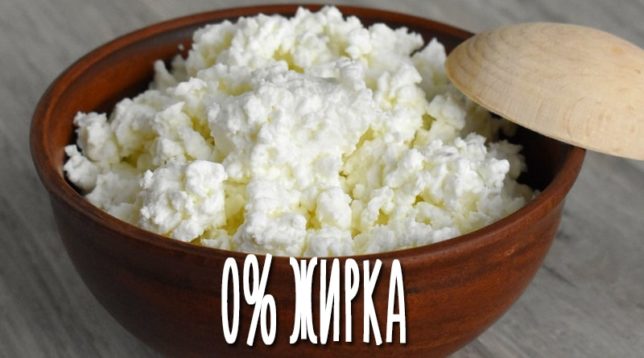
Fat-free cottage cheese is prescribed in the diet menu to restore immunity and tone after colds, it is indispensable for problems of the gastrointestinal tract.
- 3.5-4 liters of skim milk;
- 100-150 g of sour cream.
- Pour milk into the pan, warm to 40 degrees, add sour cream, stir, cover the pan with a lid and leave to ferment. After about 12 hours, the milk mass will thicken.
- Put dishes with yogurt in a pot of water (it should be larger than dishes with cottage cheese). Bring water to a boil, reduce heat to a minimum, cook for 15 minutes. Make sure that the fermented milk does not boil, otherwise the cottage cheese will turn out to be dry. Turn off the stove, leave the bowl with cottage cheese in a pan with water. Remove only after cooling.
- Pour the cooled cottage cheese into a colander lined with two layers of ordinary gauze. Place the colander on a high saucepan. To get a homogeneous consistency, while the whey drains, mix the mass a couple of times.
- Tie the edges of the gauze so that you get a bag that can be hung over the sink. In about half an hour, the serum drains.
Granular Curd Recipe
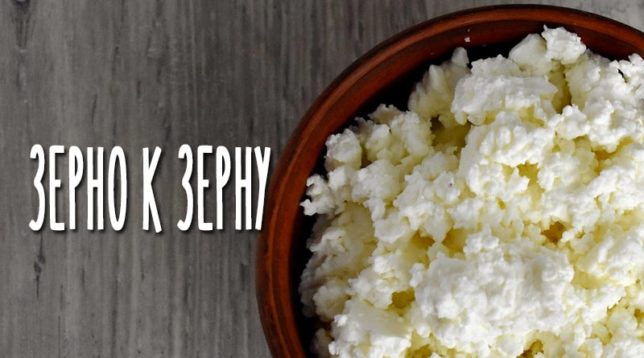
Granular curd blends perfectly with cream.
- 3-4 liters of skim milk;
- 200 ml cream;
- 1-2 pinch of salt;
- 2 tbsp. l calcium chloride.
- Heat skim milk, add calcium chloride.
- Continue cooking over low heat with constant stirring.
- Once the curd grains have formed, remove the pan from the stove and place in a large container with cold water.
- Stir several times during cooling.
- Put the cooled product on gauze, squeeze gently.
- Put the cottage cheese in a bowl, pour in the salted cream, mix.
The benefits and harms of homemade cottage cheese
Cottage cheese provides the body with everything necessary.But like any product, it has its pros and cons.
| pros | Minuses |
|---|---|
| Source of milk protein, minerals (phosphorus, iron, fluorine, folic acid) and vitamins A, E, P, group B. | From a large amount of protein, problems with the gastrointestinal tract can occur. The ideal portion is 100 g of cottage cheese per day. |
| A wonderful dietary product that can be eaten by everyone, and even babies, as well as children during the formation of teeth and active growth. | It will reduce the beneficial effect to zero if there is an allergy to milk protein and lactose. In this case, goat cheese is suitable. |
| Cottage cheese should be on the table, as often as possible with problems with joints, heart and hypertension. | |
| In order to prevent osteoporosis, cottage cheese is necessary for the elderly. |
Useful Tips

- Milk is perfectly fermented with sour cream. Use it when cooking, after dissolving sour cream (2 tbsp.) In half a glass of slightly warmed milk, then pour the cooked sourdough into warm milk, stir well until the sour cream is completely dissolved. Close the prepared mixture and put into heat. Can be used to quickly ferment yogurt makers.
- After fermentation, it is recommended to include the rennet in the milk mixture. It can be bought in a specialized department of the store. Instead of rennet, Abomin in tablets is suitable (this is also an enzyme). Two tablets are dissolved per liter of fresh milk in 125 ml of warmed water.
The most delicious cottage cheese is homemade. It is the most useful, since in its manufacture, do not use "palm oil", preservatives, diluted milk. The bad thing is that cottage cheese is rarely made at home, fearing that it is difficult. In fact, everything is elementary: fresh milk is fermented in vivo or with the help of sourdough. The resulting yogurt warms up over low heat, the finished and completely cooled cottage cheese reclines on cheesecloth. After the excess whey drains, the curd is ready.

